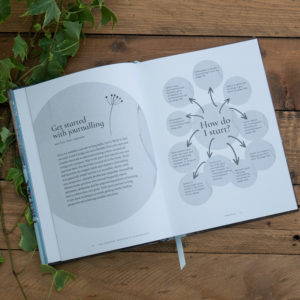Are you unsure how to begin journalling or what to write about?

Here are some productive ways to begin journalling right away. This is not the usual list of journalling topics you might find in a blogpost or magazine, they go much further than that, so it is important to follow some guiding principles.
Journal writing is a way to have a relationship with yourself, where you give yourself quality time and attention. Some of the power of successful journalling is based upon being present and focused. To experience the benefits of journalling, just as with any relationship, you need to provide regular opportunities to get together with your journal! So if you make a regular commitment, such as 30 minutes a day, you will be able to build the momentum to create an increasingly enjoyable and fruitful experience.
You need to ensure your journal writing will be private, so don’t leave it where other people might pick it up and read it. You really don’t want anyone else’s responses or opinions about your explorations. What you write in your journal is work in process, and it is never a finished product to be judged. It doesn’t benefit you to explain to anyone else in detail what you’re doing if they see you writing, as this can take you right out of the flow of what you’re enjoying about it, and make you feel uncomfortable. Nor do you need to justify the time you are spending on it, as you will soon find out for yourself whether or not you enjoy it and it brings you good results.

Create a pleasant and harmonious feeling around your journalling sessions, choose a book you enjoy writing in and a pen that helps your writing flow. Wherever you do it, make it feel like a treat.
Leave a space at the top of each page for the date and a title for each topic (you can write in the topic later). Give each page a page number, and then, if you want, you can make an index or contents page. This makes it much, much easier to find things later, and means you can raid your journal for ideas information, when you need them.
There are many, many different types of journalling so it is worth considering what type(s) of journalling would bring you the most rewards and benefits. You might want to write about your life and how you feel (life journalling), use journalling to focus and enhance a project or solve problems, or to claim some mental space to be present with yourself and review where you are, what you want to change, and what resources you need
Now for some journalling prompts 
*Write about something you really want to happen. Focus on writing about how this would make you feel, and what it would enable in your life. Then focus on what you are prepared to commit to doing to help make it happen, in small incremental steps.
*Tell the story of your life from birth in the third person (she/he/they) as if you were the author of this story, and you are looking at this person’s character and life experiences with a compassionate and yet detached eye. What is the hand that this person was dealt in life, and how have they played it out? Supposing she had deliberately chosen the parents, family and all the events as opportunities to learn something that could not be learned any other way, then what would this be? For example, because her mother was depressed, she learned from an early age to please her mother and to avoid upsetting her by playing quietly on her own and never asking for anything. As a young woman she felt unhappy about the way people treated her like a door mat, but she didn’t know what to do about it, until one day she had enough…. and she realised that her life matters, her feelings matter, and this is why she has so much empathy and understanding of other people.
 You can borrow techniques from fiction to make this vivid and immediate, such as using direct speech, writing in the present tense, jumping around time frames, and anchor each scene in a sense of place, time, and season, and who you are with. You are free to re-write any aspects of the story, and you not have to stay true to the historical facts. Where would you like the story to go next? What are the qualities she or he develops because of what they have learned from their life experience? You are now the author in control of this life story, so you can make it turn out the way you want.
You can borrow techniques from fiction to make this vivid and immediate, such as using direct speech, writing in the present tense, jumping around time frames, and anchor each scene in a sense of place, time, and season, and who you are with. You are free to re-write any aspects of the story, and you not have to stay true to the historical facts. Where would you like the story to go next? What are the qualities she or he develops because of what they have learned from their life experience? You are now the author in control of this life story, so you can make it turn out the way you want.
*Do a “brain dump” journalling session. This is a good way to get started, as it will show you the life areas that may be calling for your attention. This is where you write long lists of basically everything that is on your mind that you can think of. You do not have to write them in any order, or divide them up into categories. This could take a few sessions if you are carrying a big load in your life. Just keep going with it until you have thought of everything that concerns you, that calls your attention, that you need to remind yourself to do, or that is in the back of your mind. Getting it out of your mind and onto paper may not be something you have ever done before. Once you have downloaded your thoughts, worries, concerns, preoccupations and things you want to do into your journal, you can keep it there, and your mind will have space for some new thoughts.

Once everything is written down, you can go through your lists and colour code them, for example things that you need to remember both short term and long term, priorities that need immediate action, or items that belong to a theme or topic – such as education , family or bucket lists. Draw a line through any items you do not need to pay attention to, and just leave them behind. You can then use some techniques from Bullet journalling to help you organize all of this material. Move the various colour topics that you want to keep to new lists of their own: you can have day, week, month, project, topic and things to remember lists. Now all this is organised, it may be easier to choose to focus on one journalling topic, just any area that you are drawn to explore in more depth. Journal about the steps forward you would like to take in this area that would make you feel pleased or excited.
These techniques are fairly straightforward but they can be powerful if you are consistent with them. If you would like to find out more about the different types of journalling, and access a source of wide ranging journalling prompts and lots of information about how you can benefit from journal writing, order your copy of The Journal Writer’s Companion.


Move ahead in 2020 
If you would appreciate a structured journalling format that will take you through the whole year ahead, month by month, download the New Year New You 2020 Yearbook, which includes detailed writing prompts to accompany you throughout the year, month by month. Purchase link

Feel Connected
If you have a question about journal writing, or any difficulties come up for you, then join us at Journal Writers for Success on Facebook and introduce yourself and your query.






